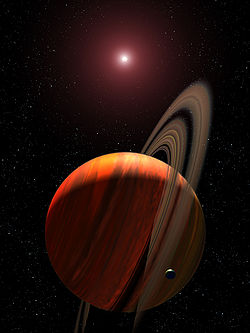Ross 128
| Ross 128 | |
 Planet Lenin, in the Ross 128 system | |
| Stellar characteristics | |
|---|---|
| Constellation | Virgo |
| Right ascension (Epoch J2000) | 11h 47m 44.3964s |
| Declination (Epoch J2000) | +00° 48' 16" |
| Spectral type | M4 V |
| Distance from Sol | 10.89 ± 0.08 ly |
| Other designations | FI Virginis, FI Vir, GCTP 2730, LHS 315, GJ 447, G 010-050, Vyssotsky 286, LTT 13240, LFT 852, HIP 57548 |
| Planets | Marx (Ross 128 a) Engels (Ross 128 b) Lenin (Ross 128 c)
|
Ross 128 is a a red dwarf star in the constellation of Virgo, approximately 10 light years from Earth. First charted by in 2011, three planets were discovered orbiting the star: two inner sub-Mercury sized planets, orbiting close to the star, and the third approximately the size of Neptune, orbiting at approximately 1 AU. There is a surprising amount of metallic dust suspended in the atmosphere of the planet, perhaps evidence of the same impact which formed which formed the planet's rings. The dust gives the planet's atmosphere a distinctive and strong red hue.
Due to its nature as a red planet orbiting a red star, the world was named Lenin, with the other two planets in system being named Marx and Engels. Orbiting Ross 128 at approximately 0.05 AU, Lenin's year is 9.9 Earth days long. Lenin has two natural satellites, Stalin and Trotsky.
Stalin is somewhat similar to the Jovian moon Io, orbiting dangerously close to its parent world. Stalin is a warm world, heated internally by tidal forces with evidence of active volcanism on its surface. Stalin is a wealthy moon in mineral resources.
Trotsky is much cooler, orbiting further from its parent, and is partially covered with ice with a few lone mountaintops peeking through.